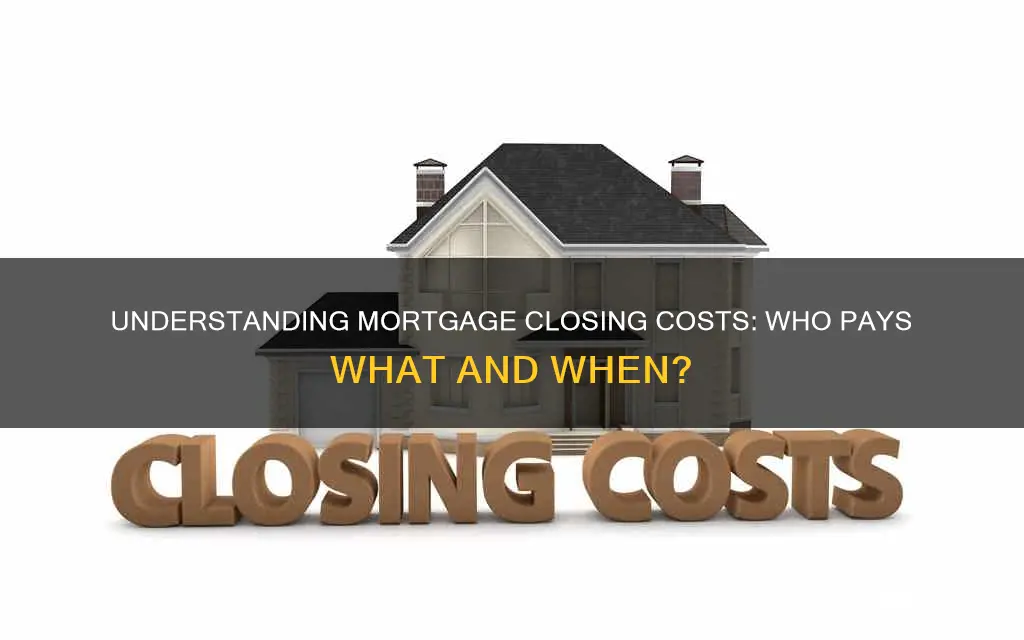
Mortgage closing costs are the fees paid to finalise a real estate transaction and are typically 2-6% of the total loan amount. These costs are paid when the mortgage is closed and cover the expenses required to finalise the loan, such as home appraisal and searches on the home's title. The specific closing costs depend on the type of loan and location, and they can be paid by the buyer, seller, or lender, or even covered by a financial gift from a relative or friend. Closing costs can be paid upfront or rolled into the overall loan balance, and they are itemised separately from the down payment on the closing disclosure.
| Characteristics | Values |
|---|---|
| When are mortgage closing costs paid? | When you close on your mortgage. |
| Who pays the mortgage closing costs? | The buyer. However, the seller might pay some of the costs, and the buyer can also ask the seller to pay some of the costs. |
| What do mortgage closing costs include? | Property taxes, title insurance, interest, home appraisal, searches on the home's title, attorney fees, mortgage rate lock, recording fee, survey fee, origination fee, application fee, underwriting fee, loan application fee, flood inspection fee, transfer fee, homeowners insurance, and more. |
| How much are mortgage closing costs? | Mortgage closing costs are typically about 2% to 6% of the total loan amount, but can vary depending on the type of loan, the lender, and the location. |
| How to pay mortgage closing costs? | By providing a cashier's check at closing or wiring funds to the escrow account. |
What You'll Learn

Closing costs are typically 2-6% of the loan amount
Closing costs are the fees for services and expenses required to finalise a mortgage and usually total 2-6% of the loan amount. They include fees for services like a home appraisal, searches on your home's title, and property taxes. The specific closing costs you'll need to pay depend on the type of loan you borrow and where you live. For example, in some states, you must get a land survey before completing a home sale, which can cost $400-$1,000.
Closing costs can also include prepaid expenses such as property taxes, homeowners insurance, and interest until your first payment is due. You may also need to prepay interest on your new loan and a portion of property taxes, depending on when you close. Closing at the end of the month can reduce the amount of prepaid interest that's due.
Other closing costs include the origination fee, which is generally 0.5-1% of the amount borrowed, and the appraisal fee, which is around $350 for a single-family home. If you use an attorney during the closing, you will also have to pay an attorney fee, although this is not required in all states.
While the buyer typically pays the majority of closing costs, the seller usually has to pay a few, too, such as the real estate agent's commission and often a real estate transfer tax. Buyers can also ask sellers to pay some of their closing costs, although the seller will usually require a higher price for the home in return.
Incorporate Closing Costs: Folding Them into Your Mortgage
You may want to see also

Costs include property taxes, title insurance, and more
Mortgage closing costs typically range from 2% to 6% of the total loan amount. These costs include property taxes, title insurance, and more.
Property taxes are fees paid to the local government to fund public services such as schools, roads, and fire departments. The amount of property tax depends on the location and value of the home. Lenders may require buyers to pay up to a year's worth of property taxes at closing.
Other closing costs include appraisal fees, attorney fees, and origination fees. Appraisal fees pay a licensed appraiser to determine the value of the home, typically costing around $350 for a single-family home. Attorney fees may be required by the state or chosen by the buyer. Origination fees are charged by the lender for creating the loan and are generally 0.5% to 1% of the borrowed amount.
Closing costs can be paid upfront at the closing meeting or rolled into the overall loan balance, increasing the principal or the interest rate. It is important to carefully review the loan estimate and closing disclosure documents to understand the projected and final closing costs.
Mortgage Prequalification: Is It Reliable?
You may want to see also

The buyer pays most costs, but sellers pay some too
Closing costs are the costs to finalise a real estate transaction and are typically paid when you close on your mortgage. They are usually 2% to 6% of the loan amount, but this can vary depending on the type of loan and where you live. For example, in 2021, the average closing costs for buying a single-family home were $6,905, while the average closing costs for a refinance were $2,375. These costs can include property taxes, title insurance, and other fees for services like a home appraisal and searches on your home's title.
Most of the closing costs are typically paid by the buyer. However, the seller usually pays some costs as well, such as the real estate agent's commission and, in some cases, a real estate transfer tax. The specific costs paid by each party can vary depending on the contract, state law, and the type of loan. For example, FHA, VA, and conventional loan programs allow the seller to pay a percentage of the home's sales price toward closing costs, with maximum percentages ranging from 2% to 9%.
Some closing costs may be paid upfront when the mortgage process begins, such as appraisal fees and home inspection fees. Additionally, some lenders may require you to put down your first month's PMI premium when you close on the mortgage. Other costs that may be included in closing are the origination fee, application fee, underwriting fee, and credit check fee. These fees are charged by the lender for processing and evaluating your loan application.
It's important to note that you may be able to negotiate closing costs or have them covered by a lender credit or financial gift from a relative. However, this usually results in a higher loan amount or interest rate. To avoid surprises, it's recommended to understand what closing costs cover and budget for them accordingly. A local real estate agent can help estimate closing costs based on your area and prospective home price.
Mortgage Advising: After the Loss of a Spouse
You may want to see also

No-closing-cost mortgages roll costs into the loan balance
No-closing-cost mortgages, as the name suggests, are mortgages that do not require the borrower to pay closing costs upfront. Instead, these costs are rolled into the overall loan balance, increasing the principal amount. This option is suitable for borrowers who want to preserve their savings or lack the funds needed for upfront payments. However, it is important to note that this approach will result in higher monthly payments and interest charges over the life of the loan.
When closing costs are rolled into the loan balance, it increases the loan-to-value ratio, which reduces the amount of equity in the home. This, in turn, leads to less profit when the home is sold, as there will be a larger lien to pay off. Additionally, a higher loan-to-value ratio may push the loan beyond the lender's threshold, requiring the borrower to purchase private mortgage insurance.
The decision to roll closing costs into the mortgage depends on various factors. Firstly, the loan program must allow for this option. Different types of loans have different rules regarding rolling in closing costs. Secondly, the impact on the loan-to-value and debt-to-income ratios should be considered. If the closing costs push the loan balance beyond 80% of the home's appraised value, the number of available loan options may decrease.
While rolling closing costs into the mortgage can provide short-term relief, it is generally more expensive in the long term due to higher interest charges. Borrowers should carefully consider their financial situation and seek expert advice to determine if this option aligns with their long-term financial goals.
Understanding Allowances: Mortgage Calculations Explained
You may want to see also

Closing costs are paid on the scheduled closing date
Closing costs are paid either by cashier's check or by wiring funds to the escrow account. In some cases, the buyer may not pay the closing fees directly and may instead negotiate with the seller for a "credit" towards their closing costs, or the lender may offer a credit. However, this usually results in a higher purchase price or loan amount to cover these costs.
Closing costs include fees for services like a home appraisal, searches on the home's title, and a credit check. They may also include prepaid expenses such as property taxes, homeowner's insurance, and interest until the first payment is due. The specific closing costs you'll need to pay depend on the type of loan, the lender, and where you live. For example, FHA loans require an upfront mortgage insurance premium of 1.75% of the base loan amount to be paid at closing.
Before closing, the lender will provide a final summary of the closing costs in a Closing Disclosure document. It's important to review this document closely and ask questions about anything unclear. Additionally, it's worth noting that closing costs can often be negotiated, and comparing fees from different lenders can help save money.
Markets: Money, Bonds, Stocks, and Mortgages, What's the Commonality?
You may want to see also
Frequently asked questions
Mortgage closing costs are the costs to finalise a real estate transaction. They include the myriad fees for the services and expenses required to finalise a mortgage.
Mortgage closing costs are typically about 2% to 6% of the total loan amount. The closing costs for buying a single-family home were $6,905 in 2021, according to ClosingCorp.
The buyer usually pays most of the closing costs, but the seller typically pays a few, too, such as the real estate agent's commission and a real estate transfer tax.
Closing costs are paid when you close on your mortgage. You will receive a mortgage loan estimate before closing on the home, outlining your mortgage terms and expenses.







